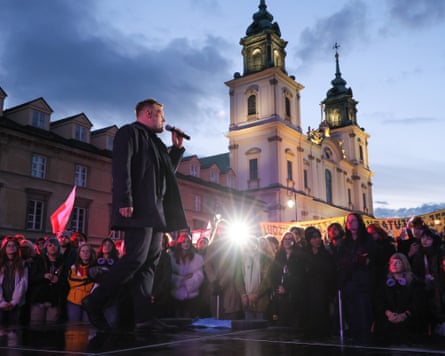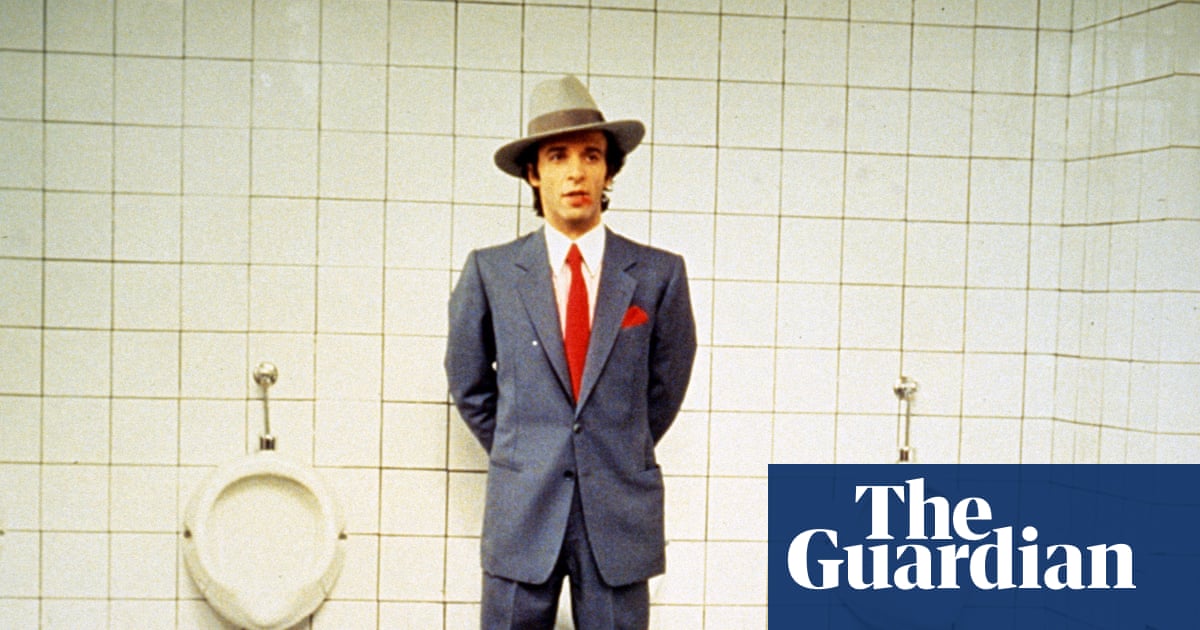Hidden off a charming market square in central Poland, a bar offers the closest physical experience to walking into the internet.
Stretching incongruously through medieval basements, Pub Mentzen in Toruń feels like it was designed by someone on a full-fat diet of online politics. As you enter, a gallery wall displays mugshots of “customers we don’t serve”, but instead of rowdy patrons, it features Polish political leaders, including at least five prime ministers.
The wall presents a surreal indictment of the country’s political elite. There is a “meme museum”, a blown-up, fake “gazillion złoty” banknote with the face of a former prime minister, and a gold-plated figure of that leader with a begging bowl. In the toilets, you listen to Donald Tusk speaking German and bizarre speeches by other Polish politicians.
The pub could be dismissed as eccentric if it wasn’t owned by Sławomir Mentzen, the tax adviser turned politician of the libertarian far-right Konfederacja (Confederation) party that has been tipped to come third in this Sunday’s presidential election in Europe’s sixth-largest economy.
And it is not just a commercial enterprise, but an expression of his politics.

About 400 people gathered in the rain as Mentzen, 38, came to his home town to deliver a shotgun pitch covering taxes, political elites, public services, EU regulations, immigration, green policies, and the general state of the world.
He first rose to notoriety in 2019, presenting “the Mentzen five”: “We don’t want Jews, homosexuals, abortion, taxes and the EU.” He has since distanced himself from that list, but remains on the far-right end of the spectrum. Emboldened by Donald Trump, he seeks to turn his unfiltered language, such as in his criticism of Ukrainians in Poland, into political strength.
His rise as the “common sense” candidate – capturing the discontent among younger male voters, and with 1.6 million followers on TikTok – allowed him to briefly challenge the mainstream conservative candidate, Karol Nawrocki, for second place in polls. Recent comments on abortion and tuition fees reversed most of his gains, but in the weeks leading up to the vote he was on course to secure a double-digit vote share.
In a well-rehearsed speech – he completed 348 rallies during his campaign – he raged against 20 years of the duopoly between the country’s two main parties: Donald Tusk’s centrist Civic Coalition (KO) and Jarosław Kaczyński’s populist-nationalist Law and Justice (PiS), which have dominated the country’s politics since 2005. In this election, they have the two frontrunners once again, in the centrist mayor of Warsaw, Rafał Trzaskowski, and Nawrocki.
“For God’s sake, how long can we wait for something to change?” Grzegorz Płaczek, a fellow Konfederacja MP,tells the Guardian. “It’s the same faces, just swapping places.”
This anti-establishment rhetoric strikes a chord. Never before in the country’s post-1989 history has the combined vote share of the top two candidates been forecast to be as low as this year.
Ben Stanley, a sociologist and political scientist at SWPS University in Warsaw, said: “PiS is far from detoxifying itself after eight years in power, while PO is seen as responsible for the government’s lack of ambition in key areas for younger voters, particularly abortion and housing. That leaves the race more open to others.”

Another challenger hoping to break the duopoly is Adrian Zandberg. Born in Denmark to Polish parents, the 45-year-old is a towering figure – literally, nicknamed “the Mighty Dane” – with a booming voice and hard-left socialist views.
In the last parliamentary election in 2023, his party, Razem (Together), ran as part of the coalition against PiS but declined to join the government because it didn’t feel it was offered the tools to meet its promises to voters.
Now “outside the tent pissing in”, he, too, has become a brutal reviewer of “two 70-year-old men” he says are stuck in disputes irrelevant to younger voters.
Addressing about 800 people near Warsaw University on Wednesday, he focused on immediate challenges facing his audience, such as housing and healthcare, as well as Poland’s long-term ambitions.
He speaks in an urgent, angry tone – crowds shout “disgrace” as he rhetorically asks them about the track record of previous administrations – and urges voters to back a Poland “made of nuclear power, silicon and steel, and not of plywood”.
He resists one label that captures his views, having recently said: “I am less interested in the word ‘the left’, more in pro-social and libertarian change.”
Aleks Szczerbiak, a professor of politics at the University of Sussex, says: “For this ‘stuff-them’ electorate, a reaction against the duopoly … the ideological profile doesn’t really matter that much.”
Zandberg’s fellow Razem MP Maciej Konieczny says the left’s response to the far right needs to go beyond “old leftwing aesthetics”, adding: “Younger people may not have settled political opinions, but they can smell bullshit and want [politics] to be about something.
“And we are credible: because we actually refused to play ball.”
Polls published before the country went into electoral silence on Friday night suggested Mentzen and Zandberg would take almost half of all votes from under-35s, streets ahead of the established candidates.
Despite polarised views on migration and abortion, some of their voters even suggested they could see themselves voting for the other candidate, instead of mainstream parties.
Angelika, a “campaigner on maternity leave”, is not surprised when asked about these views at Zandberg’s rally.
“The young electorate of Zandberg and Mentzen want largely similar things: to get stability and live a dignified life,” even if their proposed solutions are largely incompatible, she says. “Instead we get this ping-pong from PO and PiS.”
The two candidates could get up to a combined 20% of the vote share on Sunday. That would force the two mainstream candidates who are expected to advance to the runoff to at least consider how to court their supporters.
If they fail, they, too, will end up on the wall at Pub Mentzen. And the 2027 parliamentary election is just two years away, with that anger not going anywhere.

.png) 3 months ago
57
3 months ago
57

















































